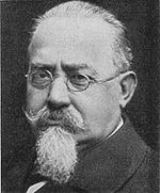Cesare Lombroso, born
Ezechia Marco Lombroso (6 November 1835 – 19 October 1909) was an
ItalianItaly , officially the Italian Republic languages]] under the European Charter for Regional or Minority Languages. In each of these, Italy's official name is as follows:;;;;;;;;), is a unitary parliamentary republic in South-Central Europe. To the north it borders France, Switzerland, Austria and...
criminologistCriminology is the scientific study of the nature, extent, causes, and control of criminal behavior in both the individual and in society...
and founder of the
Italian School of Positivist CriminologyThe Italian school of criminology was founded at the end of the 19th century by Cesare Lombroso and two of his Italian disciples, Enrico Ferri and Raffaele Garofalo .- Lombroso's conception of the "atavistic born criminal" :...
. Lombroso rejected the established
Classical SchoolThe Classical School in criminology is usually a reference to the 18th-century work during the Enlightenment by the utilitarian and social contract philosophers Jeremy Bentham and Cesare Beccaria. Their interests lay in the system of criminal justice and penology and, indirectly through the...
, which held that
crimeCrime is the breach of rules or laws for which some governing authority can ultimately prescribe a conviction...
was a characteristic trait of
human natureHuman nature refers to the distinguishing characteristics, including ways of thinking, feeling and acting, that humans tend to have naturally....
. Instead, using concepts drawn from
physiognomyPhysiognomy is the assessment of a person's character or personality from their outer appearance, especially the face...
, early
eugenicsEugenics is the "applied science or the bio-social movement which advocates the use of practices aimed at improving the genetic composition of a population", usually referring to human populations. The origins of the concept of eugenics began with certain interpretations of Mendelian inheritance,...
,
psychiatryPsychiatry is the medical specialty devoted to the study and treatment of mental disorders. These mental disorders include various affective, behavioural, cognitive and perceptual abnormalities...
and
Social DarwinismSocial Darwinism is a term commonly used for theories of society that emerged in England and the United States in the 1870s, seeking to apply the principles of Darwinian evolution to sociology and politics...
, Lombroso's theory of
anthropological criminologyAnthropological criminology is a field of offender profiling, based on perceived links between the nature of a crime and the personality or physical appearance of the offender...
essentially stated that criminality was
inheritedHeredity is the passing of traits to offspring . This is the process by which an offspring cell or organism acquires or becomes predisposed to the characteristics of its parent cell or organism. Through heredity, variations exhibited by individuals can accumulate and cause some species to evolve...
, and that someone "born criminal" could be identified by physical
defectsA congenital disorder, or congenital disease, is a condition existing at birth and often before birth, or that develops during the first month of life , regardless of causation...
, which confirmed a criminal as savage, or
atavisticAtavism is the tendency to revert to ancestral type. In biology, an atavism is an evolutionary throwback, such as traits reappearing which had disappeared generations before. Atavisms can occur in several ways...
.
Lombroso was born in
VeronaVerona ; German Bern, Dietrichsbern or Welschbern) is a city in the Veneto, northern Italy, with approx. 265,000 inhabitants and one of the seven chef-lieus of the region. It is the second largest city municipality in the region and the third of North-Eastern Italy. The metropolitan area of Verona...
on 6 November 1835 to a wealthy Jewish family.

![]()
![]()
![]()
![]()
![]()
![]()

